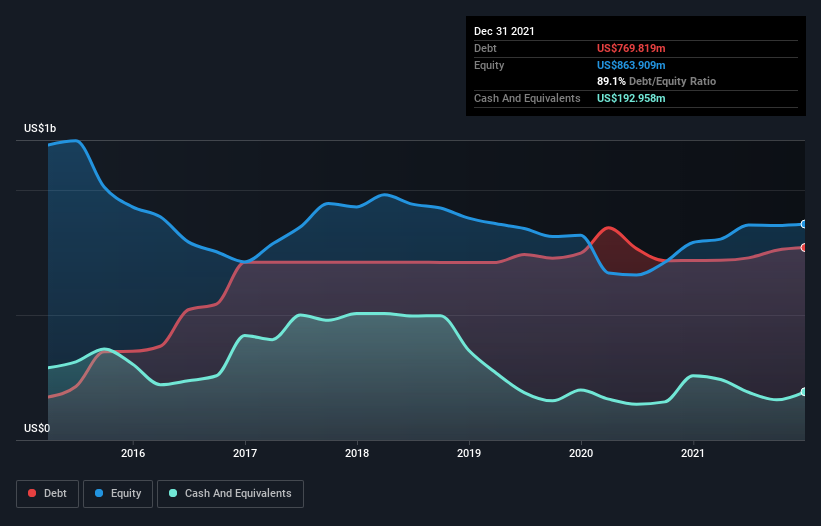
Some say volatility, rather than debt, is the best way to think about risk as an investor, but Warren Buffett famously said that 'Volatility is far from synonymous with risk.' It's only natural to consider a company's balance sheet when you examine how risky it is, since debt is often involved when a business collapses. As with many other companies Lincoln Electric Holdings, Inc. (NASDAQ:LECO) makes use of debt. But is this debt a concern to shareholders?
When Is Debt A Problem?
Debt is a tool to help businesses grow, but if a business is incapable of paying off its lenders, then it exists at their mercy. Part and parcel of capitalism is the process of 'creative destruction' where failed businesses are mercilessly liquidated by their bankers. However, a more common (but still painful) scenario is that it has to raise new equity capital at a low price, thus permanently diluting shareholders. Of course, debt can be an important tool in businesses, particularly capital heavy businesses. When we examine debt levels, we first consider both cash and debt levels, together.
View our latest analysis for Lincoln Electric Holdings
What Is Lincoln Electric Holdings's Net Debt?
As you can see below, at the end of December 2021, Lincoln Electric Holdings had US$769.8m of debt, up from US$718.2m a year ago. Click the image for more detail. However, it does have US$193.0m in cash offsetting this, leading to net debt of about US$576.9m.

How Healthy Is Lincoln Electric Holdings' Balance Sheet?
According to the last reported balance sheet, Lincoln Electric Holdings had liabilities of US$755.9m due within 12 months, and liabilities of US$972.5m due beyond 12 months. Offsetting this, it had US$193.0m in cash and US$454.4m in receivables that were due within 12 months. So its liabilities total US$1.08b more than the combination of its cash and short-term receivables.
Given Lincoln Electric Holdings has a market capitalization of US$7.54b, it's hard to believe these liabilities pose much threat. Having said that, it's clear that we should continue to monitor its balance sheet, lest it change for the worse.
In order to size up a company's debt relative to its earnings, we calculate its net debt divided by its earnings before interest, tax, depreciation, and amortization (EBITDA) and its earnings before interest and tax (EBIT) divided by its interest expense (its interest cover). Thus we consider debt relative to earnings both with and without depreciation and amortization expenses.
Lincoln Electric Holdings has a low net debt to EBITDA ratio of only 1.0. And its EBIT covers its interest expense a whopping 21.3 times over. So we're pretty relaxed about its super-conservative use of debt. On top of that, Lincoln Electric Holdings grew its EBIT by 44% over the last twelve months, and that growth will make it easier to handle its debt. There's no doubt that we learn most about debt from the balance sheet. But ultimately the future profitability of the business will decide if Lincoln Electric Holdings can strengthen its balance sheet over time. So if you want to see what the professionals think, you might find this free report on analyst profit forecasts to be interesting.
Finally, a company can only pay off debt with cold hard cash, not accounting profits. So we always check how much of that EBIT is translated into free cash flow. During the last three years, Lincoln Electric Holdings produced sturdy free cash flow equating to 78% of its EBIT, about what we'd expect. This free cash flow puts the company in a good position to pay down debt, when appropriate.
Our View
The good news is that Lincoln Electric Holdings's demonstrated ability to cover its interest expense with its EBIT delights us like a fluffy puppy does a toddler. And that's just the beginning of the good news since its EBIT growth rate is also very heartening. Overall, we don't think Lincoln Electric Holdings is taking any bad risks, as its debt load seems modest. So we're not worried about the use of a little leverage on the balance sheet. There's no doubt that we learn most about debt from the balance sheet. However, not all investment risk resides within the balance sheet - far from it. Be aware that Lincoln Electric Holdings is showing 2 warning signs in our investment analysis , you should know about...
At the end of the day, it's often better to focus on companies that are free from net debt. You can access our special list of such companies (all with a track record of profit growth). It's free.
New: AI Stock Screener & Alerts
Our new AI Stock Screener scans the market every day to uncover opportunities.
• Dividend Powerhouses (3%+ Yield)
• Undervalued Small Caps with Insider Buying
• High growth Tech and AI Companies
Or build your own from over 50 metrics.
Have feedback on this article? Concerned about the content? Get in touch with us directly. Alternatively, email editorial-team (at) simplywallst.com.
This article by Simply Wall St is general in nature. We provide commentary based on historical data and analyst forecasts only using an unbiased methodology and our articles are not intended to be financial advice. It does not constitute a recommendation to buy or sell any stock, and does not take account of your objectives, or your financial situation. We aim to bring you long-term focused analysis driven by fundamental data. Note that our analysis may not factor in the latest price-sensitive company announcements or qualitative material. Simply Wall St has no position in any stocks mentioned.
About NasdaqGS:LECO
Lincoln Electric Holdings
Through its subsidiaries, designs, develops, manufactures, and sells welding, cutting, and brazing products worldwide.
Excellent balance sheet established dividend payer.

